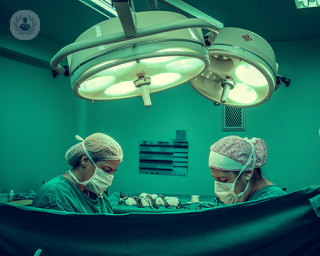Polypectomy
Dr Amit Chattree - Gastroenterology
Created on: 11-13-2012
Updated on: 03-22-2023
Edited by: Aoife Maguire
What is a polypectomy?
A polypectomy is a minimally-invasive procedure carried out with a colonoscope or hysteroscope to remove polyps in certain parts of the body such as the colon or uterus, therefore, the most common types of polypectomy are colon polypectomy and uterine polypectomy.

Why is a polypectomy done?
A polypectomy is done to remove polyps, which are abnormal growths that can grow in size, causing problems, bleed or be cancerous. Usually, once a polyp is removed, they will be examined in a laboratory to determine whether it is cancerous or not. However, most polyps are benign (non-cancerous). Polyps in the colon are often found during a colonoscopy, which is offered to people in the UK over the age of 50 to check for early signs of colon (bowel) cancer. If signs of cancer are found, then usually further tissue will need to be removed and other cancer treatments discussed.
How is a polypectomy performed?
Polypectomy by hysteroscopy for uterine polyps are carried out by introducing a hysteroscope through the vagina and the cervix to remove or cut polyps with special surgical instruments.
Colon polyps are usually removed at the same time as a colonoscopy. A colonoscope is a special, thin, flexible tube inserted into the rectum and into the colon. It has a light and camera to show the insides of your colon, allowing the surgeon to introduce special instruments to remove any polyps found. There are two main methods of polyp removal via colonoscopy:
- Snare polypectomy – a thin wire is looped around the base of the polyp and is cauterised with heat, which stops any bleeding and cuts off the polyp.
- Piece-meal polypectomy – this can remove larger polyps by removing the polyp piece by piece.
Preparation for polypectomy
For a colon polypectomy, the bowel must first be cleared. This is done by performing an enema before the test using a special at-home kit. Local anaesthesia is used for uterine and colon polypectomies, and there should be little to no discomfort.
Aftercare
Following a uterine polypectomy, you can return home the same day. It is normal to have some bleeding for 4-5 days, as well as some brown-coloured discharge. You should take 1-2 days off work to rest.
Following a colon polypectomy you can return home the same day, and you can expect to experience some bloating and cramps for the first 24 hours. You will need to avoid certain foods, such as spicy food, coffee, tea, alcohol and fizzy drinks. For both types of polypectomy, you should not drive for 24 hours. Once the polyps have been analysed, if cancer is detected your doctor will schedule a follow-up to discuss next steps.







